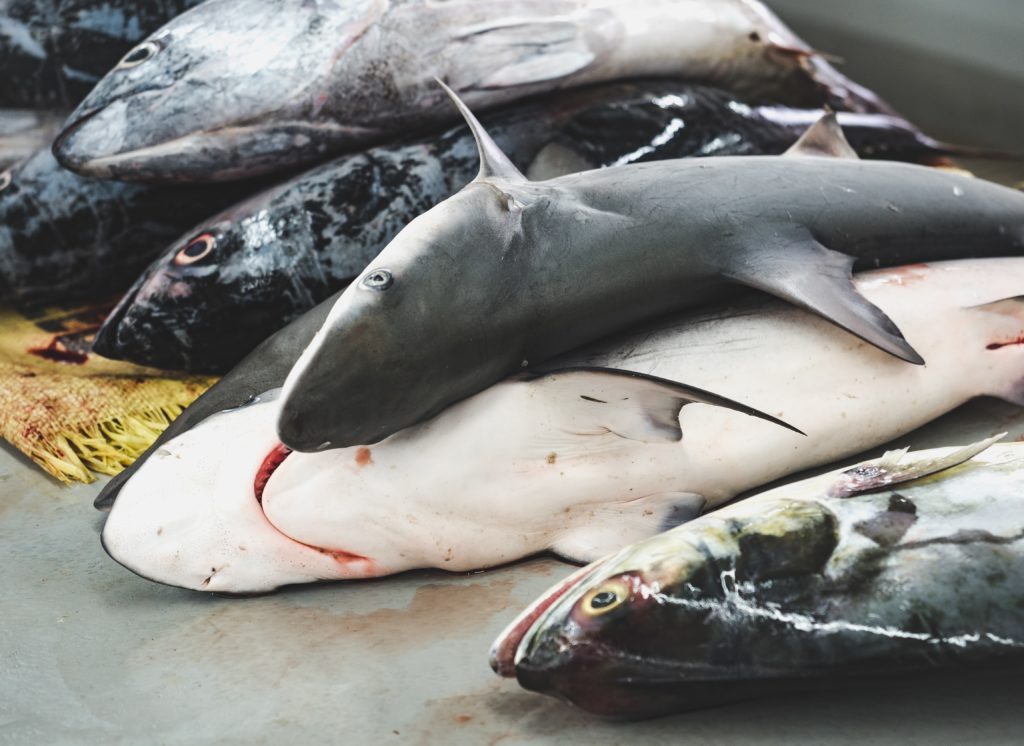
Millions of fishes suffocate every day!
The vast majority of fishes is voiceless, they can not scream for help and die almost silently. Not a single shriek sounds, even when thousands of fish are squeezed together in nets and lifted out of the water. Not all these victims of industrial fishing suffocate miserably because of being exposed to the air. Some succumb to bleeding due to accidental injuries and contusions, caused by other fishes and aquatic animals caught in the nets and fighting panic-stricken for survival, or during their catching, or while filling them in collecting tanks of fishing boats, with crew members thoughtlessly trotting over them. Fishes caught in industrial fishing usually die slowly and probably painfully. These fishes are predominantly intended for human consumption, as animal feed or as fertilizer. Or, together with other marine animals, they are destroyed completely uselessly as unwanted bycatch. The carcasses of those animals, which make up more than seven million tonnes of unused bycatch every year in commercial fishing and also affect endangered species, are carelessly disposed of in their former habitat. The worst hit fishes are several hundred thousands of sharks of many different species year after year, which are totally underestimated, considering their important role in marine ecosystems. Some shark fishermen cut them off all fins alive, before they mostly throw the amputated sharks overboard. If they are still alive, they either bleed to death in the sea or suffocate because the locomotion necessary for gill respiration has become impossible. The shark fins are later dried and exported to China for the preparation of very much sought-after soups.
Most of the wild catches from lakes, ponds and streams, as well as most fishes from fish farms also die slowly from asphyxiation. Only a tiny fraction of all food fishes dies quickly, guaranteed without much agony and stress. Estimated to be hundreds of billions of fish each year, the victims of human appetite are not only robbed of their lives. Widespread thoughtlessness denies these a quick death as pain-free as possible, thus takings away their last vestiges of dignity.
It is high time to show fish consumers the usually miserable and brutal end of their victims, in order to stop this merciless and unacceptable practices as soon as possible!
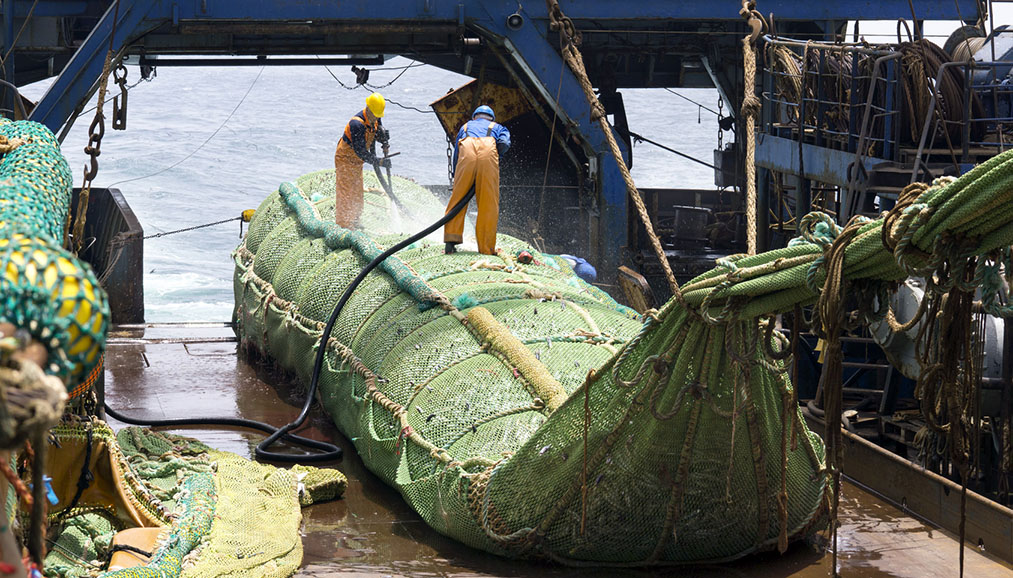
Industrial fishing is the biggest looting of nature!
Industrial fishing is spreading with increasingly well-equipped fishing fleets and floating fish factories to the remotest areas of the world’s oceans. The reason for this is the unleashed appetite for fish products by the rapidly growing human population and their livestock. Even with constant demand, more and more fish would die. Responsible for this trend is the large-scale overfishing, which means that fewer and fewer fish reach adulthood and their full lenght, so that the captured animals are getting smaller. Also because of the promoted dietary trend to more fish instead of meat, the exploitation of fish stocks is constantly increasing. This greed for “good” proteins of animal origin consistently fuels the market for fish products. Added to this is the rapidly growing demand for fishmeal and fish oils by the rapidly multiplying fish farms, for feeding their stocks of various predatory fish. All this means considerable stress, probably suffering and guaranteed death for more and more fishes.
By-catches are far from the only collateral damage in the fishing industry. Often, the methods used there, destroy sensitive habitats, and the capture of coveted species of food fish affects marine ecosystems. The overuse of some populations of sharks, sword fish and tuna as well as toothed whales, which are positioned at the end of the marine food chains and provided for dynamic ecological equilibria and natural species spectra, causes an intensified reproduction of their main preys. Some particularly voracious species out of these, which were heavily preyed before by the large predatory fish and whales, spread so much after the removal of their natural ennemies, that they have become serious food competitors for humans. For example, populations of the Humboldt squids near the American West coast, which now rise without much danger from the deep into the upper, nutrient-rich water layers, exploded in some areas. Reports indicate increasing numbers of attacks on humans by these extremely dangerous marine predators called “red devils” by local fishermen. The uncontrolled spreading of Humboldt squids into more distant marine areas is also to be feared because of their very high reproduction rate in absence of its natural ennemies. Neither their fishing, nor any other human intervention can prevent the proliferation of these and some other species, that benefit from large-scale overfishing. Unfortunately, several negative effects of continued overfishing on marine ecosystems and the world’s increasing food demand are unavoidable. However, their final dimensions and consequences for the biosphere and its aquatic ecosystems are unpredictable until further evidence.
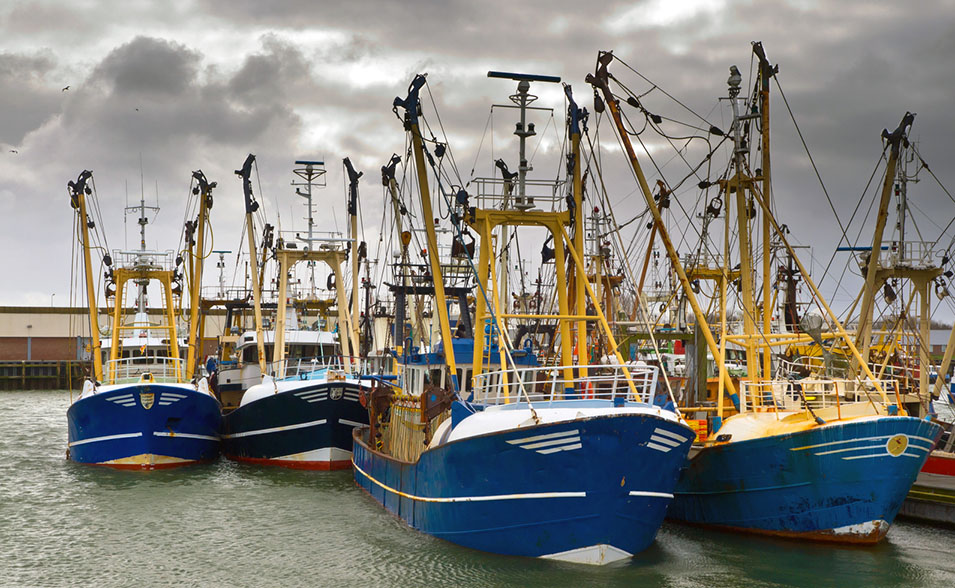
Farmed fishes are usually no alternative!
Due to overfishing, the proportion of food fishes produced in fish farms for the markets is growing rapidly and increasing numbers of specimens of more and more species are coming from commercial farms. Much of the fishes that land in kitchens have never crossed a natural body of water. They had only a poor life in fish farms and knew only spatially restricted and unstructured breeding ponds, net enclosures or marine cages. The farmed fishes are usually kept in isolated groups with conspecifis of similar body sizes in a confined space. They suffer stress due to the profit-maximizing, extremely high stocking densities and can never act out most of their natural behavior patterns. The high stocking densities favor diseases and parasitic infestations which require regular administration of medicines and withdrawals of fishes for their close inspection. These withdrawals from the breeding containers are usually made manually with nets and cause stress not only to the fishes temporarily exposed to the atmosphere, but also to others in the affected containers, be it for that purpose or for checking their sexual maturity, the extraction of eggs and other routine manipulations. Predatory fish species are usually fed in fish farms with fishmeal and oil derived from inexpensive fish species from industrial fisheries. Thus, fish farms keeping coveted predators such as trout, char, salmon and tuna are partly responsible for the overfishing of the oceans wit its negative consequences! When reaching the respective desired carcass weight, farmed fishes are even more closely packed together and partly kept so for several weeks under increased stress and without any food in order to empty their digestive tracts until marketing, before the majority of them is killed or suffocates without anesthesia. Compared to wild caught fishes, where at worst their catching and killing are unacceptable impositions by humans, the entire, miserable life of the vast majority of farmed fishes is a disgrace!
In addition to various animal welfare problems and their part of responsibility in overfishing by numerous predatory fish cultures, fish farming causes further environmental problems. Particularly problematic are the fish cultures built in natural waters, which cause harm to the aquatic environment with food leftovers, excrements and drugs, which pollute the basins of seas and lakes around them. The leftovers and fish feces washed out from the farm nets and cages attract free living fishes, which can then be attacked by parasites, and probably also by pathogens from farmed fish. From time to time farmed fishes manage to escape from such facilities into natural water bodies and the sea, which can cause fatal faunal distortions and impairments of natural gene pools of wild populations in cases of crossbreeding with farmed fishes. All these damages to the environment through open fish farms happen at the expense of common property to the exclusive financial advantage of mostly private companies and business people, some of which even receive substantial subsidies, as is it the case in the European Union.
Finally, the visual impact of open fish farms established near idyllic sea coasts and in beautiful lakes and rivers visited by people for enjoyment, are another source of concern.
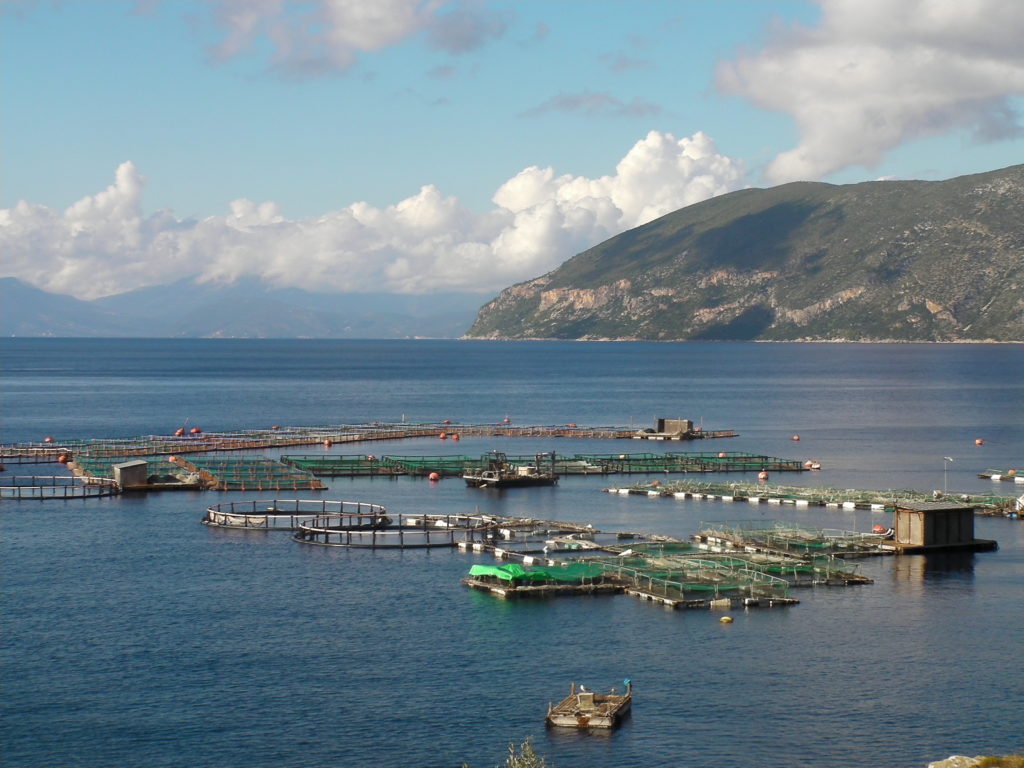
Due to their enormous consumption of water, energy and fish food, closed fish farms are by no means environmentally friendly, a fact that together with outlined animal welfare problems, disqualifies them as a sustainable alternative to fishing.
Fates of fish are being ignored
When the word “fish” comes down, most people immediately think of fish as food, even though only a very small fraction of fish species serve the human nutrition. This already says a lot about the extremely one-sided and distant relationship of humans to fishes. This great distance to these other vertebrates has several causes. First and foremost, it is based on the fact that fish live almost exclusively in the water, which is why our knowledge is essentially limited to the anatomy of trapped or stranded specimens of relatively few species and to some behavior patterns of several fish species, most of which were studied under completely unnatural conditions. Despite our common ancestors, their comparatively original anatomy strongly deviates from that of the mammals, who adapted to a life on land and therefore changed greatly. These great anatomical differences, and the very limited knowledge about fish behavior make it even more difficult for humans, to develop any stronger emotional connection with them. In addition, possibilities of communication between fishes and people are severely restricted, due to their strictly separated habitats, and the far-reaching voicelessness of fishes. All this accounts for the deplorable lack of empathy and compassion for fishes in general. The few people who actively engage in the protection of fishes usually do so out of concern for threatened ecosystems or fish populations, that are particularly important to humans, or to other species of value to them. So far, respect or sympathy for the countless numbers of fishes persecuted and slowly killed by people has only rarely been demanded vociferously. Even those environmental organizations, that rightly denounce the plundering of the oceans by the fishing industry, largely ignore the utterly unnecessary stress and cruel deaths of hundreds of billions of fish victims each year. That had to change! The fateful lack of the public´s and relevant associations’ interest in the immense barbarity in dealing with fishes and its dimensions, has led LIFE UNION to make the fight against these intolerable abuses a priority of its activities. The primary objective is to spare fishes the unreasonable suffering during their persecution, handling and death struggles caused by fishing and breeding activities. Because until now, there are in fact no generally binding and species-specific animal welfare requirements for catching and keeping fishes, not even for food and feed fish. But the worldwide mass tortures of catching, keeping and killing these fishes, as well as the intolerable bycatch and destruction of aquatic habitats, must be stopped as soon as possible.
Fish consumers need to be informed
Many consumers of fish products are cogs in a very destructive international industry, which leads to the overfishing and to the impoverishment and devastation of entire coastal regions. Fish consumers are the decisive contractors of the relevant trade, and are thus, often unconsciously, responsible for procuring themselves such food with all the negative effects of fishing and fish production. Indirectly, they decide how many and which fishes are caught where and how, or raised and killed in fish farms. So far, the fish consumers have mostly been interested only in the prices, tastes, relative amounts of fishbone and aspects of food fishes. This extremely limited consumerist view is to be replaced as quickly as possible by an expanded look at fishes as living beings with complex behaviors and needs, as well as ecological functions, rather than just seeing them as food and protein sources. All the more so, as in part creatures with astonishing intelligence yet to be discovered, are killed without any consideration in huge numbers as mere protein suppliers for humans and their farm animals and pets. Most food and feed fishes were part of aquatic communities and had a life commensurate with their species´ requirements before being torn from their natural habitats, to meet the ever-growing demand for fishes and derived product, or to end up as industrial fishery waste in the worst case. Commercial fishery uses originally military technologies such as radars and sonar systems up to helicopters and drones to detect profitable fish swarms. Because of technologic development, it destroys and endangers more and more natural fish populations, and pushes several once-widespread species within a few decades onto the red list. In comparison to the food fishes roaming free until their fatal catch, countless captive bred specimens must probably suffer all their short and boring life in aquacultures worldwide, until their often similarily cruel death frees them from there. The irresponsible use of fishes as the most commonly exploited vertebrates must be urgently made aware to all involved stakeholders and the public, to successfully counteract against possible mass torture and ongoing habitat destruction, as well as the accelerated biodiversity loss in aquatic ecosystems.
With your support, LIFE UNION wants to appear as a worldwide audible voice for the almost voiceless and therefore critically neglected fishes. First of all, many consumers are to be informed about various abuses during the catching and breeding of fishes for food or animal feed and be encouraged to think deeply about their consumption of fish products. Only responsible consumption and critical buying habits can quickly provide the exploited fishes a minimum of respect from the producers and traders of fishes and products made from them.
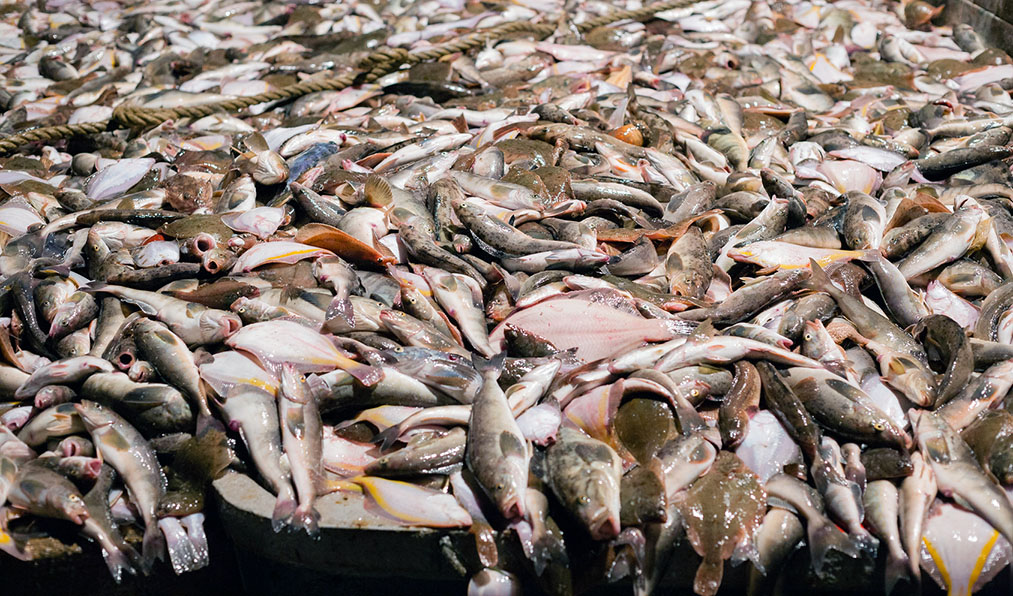
Realistic concepts against mass barbarism
The current reality of persecution, catching, mass keeping and destroying fishes is already the greatest barbarity of all time in terms of its dimensions, without any signs of a decline in its dramatic development being in sight. Only when a critical mass of consumers will demand respectful and environmentally friendly fishing and rearing, as well as low-stress killing of fishes from the fish trade, will the vast majority of those involved in the lucrative marketing of fishes abide by it for their own economic interests. This path is the only realistic chance to put an end to the many environmental impacts, unnecessary stress and cold-blooded mass killings in commercial fishing and breeding operations.
However, this requires applicable solutions to the identified problems as well as corresponding product alternatives. Unfortunately, there are not enough ethically acceptable fish products around the world to satisfy the increasing demand for them. As a first step, low-stress killing, as it has long been practiced manually by sensitive sports fishermen, could be developped by technical means with reasonable efforts within a few years, be it thanks to a previous anesthesia or a fish killing method with quite immediate effect. To this end, globally experienced experts should be identified, motivated, recruited and networked for this urgent task. After all, development of a humane procedure for the most painless as possible fish killing is certainly only a matter of knowledge, enough perseverance, good will and efficient cooperation. Methods using electric shocks or similarily fast acting pressure waves that kill fishes, if possible, almost immediately still in the water, or at least stuns them reliably until their subsequent killing, seem to be the most suitable options for that purpose. It would also be possible to develop and implement procedures for catching fishes without significant by-catches and without collateral damages, as well as environmentally and ethically irreproachable fish farming. With the necessary support of consumers and the corresponding political determination, such innovations could be enforced internationally with legal accompaniment throughout commercial fishing and fish farming. Support this important fight to stop the unnecessary suffering of billions of fishes as well as the grievous destruction of bycatch and natural habitats!
